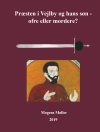On the Shortness of Life Seneca – On the Shortness of Life in English is a moral essay written by Seneca the Younger in 49 AD, a Roman Stoic philosopher, to his father-in-law Paulinus. The philosopher brings up many Stoic principles on the nature of time, namely that men waste much of it in meaningless pursuits. According to the essay, nature gives man enough time to do what is really important and the individual must allot it properly. In general, time can be best used in the study of philosophy, according to Seneca.
About the author
Lucius Annaeus Seneca (often known simply as Seneca, in Portuguese Séneca (PT) or Sêneca (BR); ca. 4 BC 65 AD) was a Roman Stoic philosopher, statesman, dramatist, and in one work humorist, of the Silver Age of Latin literature. He was tutor and later advisor to emperor Nero. While he was later forced to commit suicide for alleged complicity in the Pisonian conspiracy to assassinate Nero, the last of the Julio-Claudian emperors, he may have been innocent












